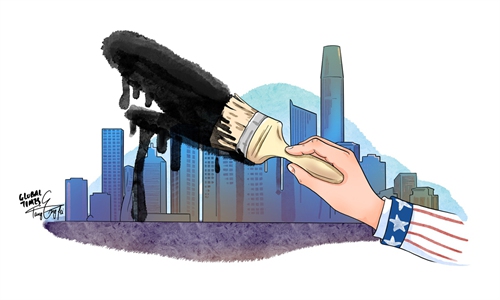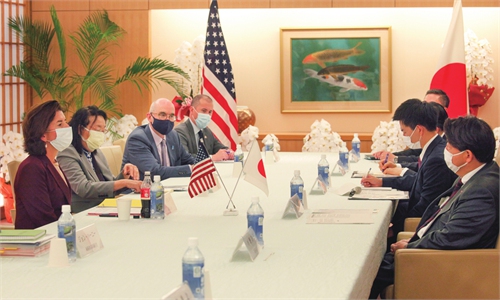COMMENTS / COLUMNISTS
China, US display differences in tackling economic risks

China, US display differences in tackling economic risks. Illustration: Tang Tengfei/GT
"It's the economy, stupid."
This phrase comes to mind, as we watched US President Joe Biden this week sought to handle mounting economic headwinds and, more importantly, salvage his rapidly falling approval ratings. The phrase was coined by the veteran US political consultant James Carville to describe one of the three main massages of Bill Clinton's successful presidential campaign in 1992. It has become a popular phrase used by US pundits to talk about the key themes of US politics.
As the US economy faces dangerous levels of inflation unseen in 30 years and his approval numbers continue to hit new lows, Biden wanted to push the message that he's got the economy under control. On Tuesday, while announcing that he would release emergency oil reserves to cool surging prices and that he had coordinated with other countries, including China, to do the same, Biden boasted that the US economy has seen "historic progress" in its recovery from COVID-19.
Forget about the fastest rise in inflation since 1990 or supply chain disruptions across the country, it's hard to imagine US consumers, who are reaching deeper into their wallets for Thanksgiving dinners than ever before, and US businesses, which are paying more for everything from materials to shipping, would be related to this so-called "historic progress."
Meanwhile, in China, top officials also sought to address mounting economic headwinds. But in stark contrast to Biden's message, Chinese officials focus on sounding the alert on major risks and challenges and are outlining measures to tackle them.
On Monday, Premier Li Keqiang chaired a meeting with top provincial-level officials in Shanghai, stressing the lingering uncertainties and risks across a number of areas in the Chinese economy, including surging commodity prices, strained energy supply, and severe natural disasters.
In very blunt terms, Li said that new challenges encountered by China's development even exceeded expectations, and that the Chinese economy faces "new downward pressure". While urging confidence building, he called for better assessment of risks and challenges, and a more comprehensive response, emphasizing the implementation of a range of measures to help various sectors, particularly small and medium-sized enterprises (SMEs).
Such straightforward talking of risks and challenges from the Chinese premier drew attention from a host of foreign media outlets, with some seeking to hype up the challenges and paint a gloomy picture of the Chinese economy, their long-standing narrative. Many foreign media outlets have long accused Chinese officials of downplaying China's economic challenges.
But what's also been ignored, per usual, is the swift responses and measures Chinese officials have taken to address specific problems, including plans to further step up support for SMEs, issuance of local government special bonds, tightened regulation for various high-risk sectors, including finance and housing. Just this week, there were at least a dozen top-level meetings and official circulars specifically focused on challenges both in the short-term and the long-term.
On Wednesday, the 22nd meeting of the central committee for deepening overall reform attended by top leaders approved several documents addressing the issues, including bolstering science and technology research and development and reforming the electricity market.
There is no denying that both the Chinese and the US economies face mounting downward pressure. The key difference between the world's two largest economies is the actual grip on the real economic situation and concrete actions to address pressure points, not paying lip service to win political points.
US officials have been obsessed with talking about "competition" with China and have been trying to make their policy agenda centered on containing China - and they have been quite successful in that attempt, as they unleashed a tsunami of misinformation and blatant slandering against China - but ultimately, as Carville put it so succinctly, it's "the economy, stupid."
The author is an editor at the Global Times. bizopinion@globaltimes.com.cn



